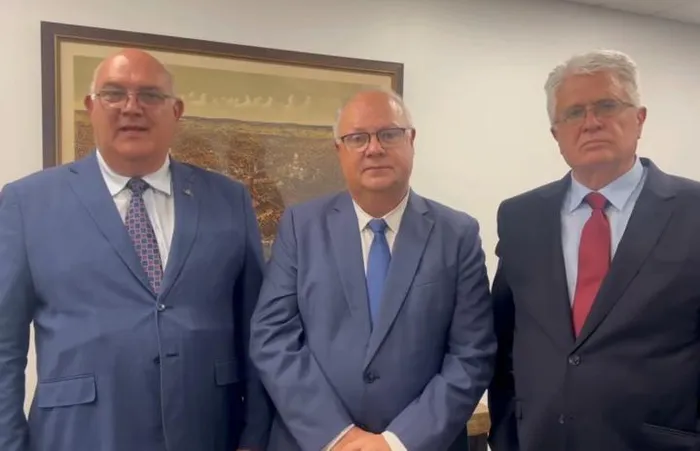US demands on exemption from South Africa's BEE requirements yet to be addressed with Ramaphosa

The Freedom Front Plus delegation in Washington last week.
Image: Facebook/FFPlus
FF Plus leader Corné Mulder says he has yet to brief President Cyril Ramaphosa on claims that the Trump administration has demanded that US entities be exempted from all Black Economic Empowerment (BEE) requirements as a precondition for normalising bilateral relations with South Africa.
There are more than 600 US companies based in South Africa.
Mulder made the claims as a FF Plus delegation returned from the US where they met with senior White House officials.
This demand was part of a broader set of conditions that include addressing farm attacks, condemning the "Kill the Boer" chant, and ensuring fair market compensation for land expropriation.
According to Mulder, the White House officials expressed concern that these conditions have not been adequately addressed.
In May, President Cyril Ramaphosa and his delegation embarked on a working visit to the US to meet with US president Donald Trump to help reset strained relations between the two countries, and secure a favorable trade deal after a fallout over the International Court of Justice (ICJ) case against Israel that had been instituted by South Africa.
Mulder, who held a press briefing on yesterday, said the delegation was committed to normalising relations between South Africa and the US and described Ramaphosa's visit with Trump in May as 'premature'.
"We have a clear understanding of the US Administration's expectations," Mulder said.
"The delegation has undertaken to communicate these pre-conditions to both the South African government and the broader public in the interest of transparency, accountability, and the restoration of strong bilateral ties,” said Mulder.
Mulder added that they had not gone to the US to complain.
He said that discussions on claimed genocide did not arise and they did not meet with the 50 white Afrikaners who were granted refugee status by the Trump administration.
Southern African Agri Initiative chairman Theo de Jager, and National Employers’ Association CEO Gerhard Papenfus were also part of the delegation.
According to business group Sakeliga's CEO Piet le Roux, this development marks a substantial escalation in international pressure against South Africa's 'race-restrictive economic policies'.
"The international backlash against BEE and other race-restrictive policies of the South African government is set to escalate further in the coming months and years," Le Roux said.
Le Roux noted that the US demand elevates race-restrictive legislation beyond domestic affairs to the level of international economic and diplomatic relations
This could lead to a ratcheting up of US-led bilateral or multilateral pressure opposing restrictive legislation in South Africa.
Speaking on BEE, De Jager said there was only one way to avoid economic migrants and that was by improving their livelihoods.
"The principle here is that there must be equal citizenship…there must be respective property rights and there must be an environment where we can also do business.
“They (Trump administration) said to us that they had heard us on the BEE matter, that it is a non-trade tariff barrier and they said that they would not restore any trade relationship if these preconditions are not adhered to.
“The biggest war of our generation is poverty and hunger and the only way we can deal with that is to create wealth…So we are gradually losing investment because of the likes of BEE and the threat to expropriate your property without compensation. You cannot invest in a country where you are not safe.
“We need an environment that will safeguard investment whether you are black or white. As Afrikaners we don't have access to production financing anymore. We need that kind of access,” said de Jager.
Department of International Relations and Cooperation (DIRCO) spokesperson Chrispin Phiri told IOL that the group was pursuing its "own agenda".
"Our experience is that State actors do not use non-state actors as intermediaries; therefore, the Freedom Front Plus' (VF Plus) visit and subsequent pronouncements will be viewed as nothing more than their ambitions," he said.
Presidency spokesperson Vincent Magwenya did not respond to questions on how the South African government would react to the US demands.
However, Ramaphosa has previously indicated that he would not back down from implementing BEE policies.
"BEE is not holding back the economy, but rather the concentrated nature of our economy is," Ramaphosa said.
He defended using racial designations as a means to address economic disparities, although he acknowledged that this might not be necessary in the future.
Political Analyst John Molepo said the US demand for BEE exemption could lead to a diplomatic escalation between the two countries with possible scenarios including the US imposing targeted international sanctions or formal complaints and consequences for what could be considered South Africa's violation of World Trade Organisation agreements.
mashudu.sadike@inl.co.za
DAILY NEWS
Related Topics: